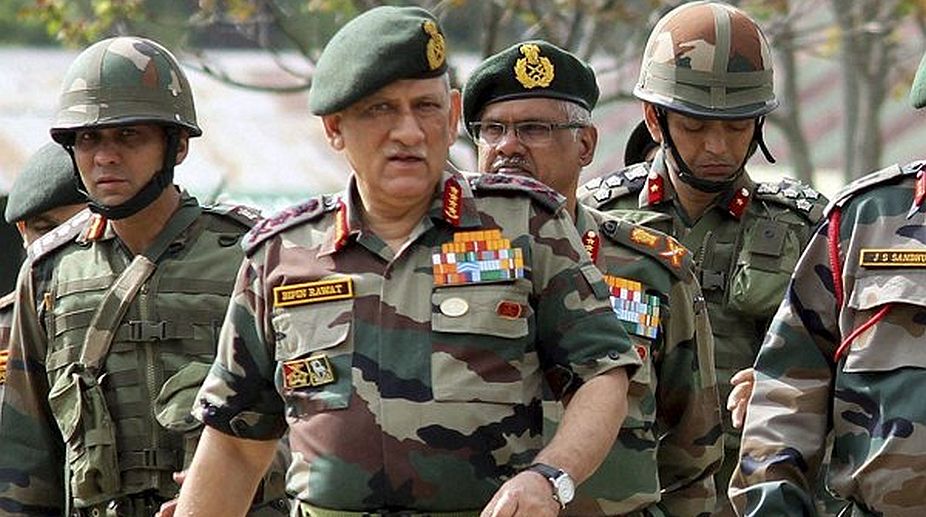Undeterred by criticism from politicians and commentators, Army Chief General Bipin Rawat says use of human shield by the India Army is not a norm but individual officers are entitled to decide the tactic depending on circumstances.
He also dismisses criticism that the Army is trigger-happy, but says the level of violence in Jammu and Kashmir needs to be brought down for any meaningful dialogue with stakeholders. "Dialogue and violence cannot go together," General Rawat said in an interaction here at his office.
Advertisement
The Army Chief maintains that the situation in Jammu and Kashmir is not as bad as it is portrayed in the media and dismisses a perception that people of the state are against the Army.
"It (human shield) is not a general norm. As a practice it is not supported. But situations would dictate. Under the circumstances he (Major Leetul Gogoi) took a decision independently. He can't look back at that stage and wait for orders. I think in his own wisdom he took the action," General Rawat said.
"If somebody has any other ideas as to how to tackle such a situation, then he can pass it on to us. We will take a look at it," he said.
General Rawat was asked to comment on a string of criticisms about his earlier remarks defending Major Gogoi's action of tying a civilian to the bonnet of an Army jeep when facing a crowd of stone pelters in the valley.
He was then criticised for justifying the Major's action that was described as unprofessional and damaging to the reputation of the Indian Army and being violative of the Geneva Convention that lays down rules of warfare.
Replying to a question on the comments by CPI-M leader Prakash Karat over his reported remarks that stone pelters should rather use guns as amounting to instigating them to take to guns, General Rawat maintained that he was misquoted on the issue.
"In a proxy war situation like this the enemy cannot be identified. He is not wearing a band or a uniform that can identify him as a terrorist. Only when he fires then you know what to do in such a situation. The Army cannot throw stones, that is not my pattern. I can't throw stones."
Asked about the absence of any dialogue with stakeholders in Jammu and Kashmir and whether there can be a military solution that can be lasting, General Rawat said it should be an "integrated" solution.
"Military has to bring the violence level down. We have to bring peace for the people of Jammu and Kashmir. After all, it is the poor people like daily wagers, pony walas, shikaras, and others who depend on tourism like hotels. Students are also affected as schools and colleges are shut.
"They have already seen one bad (tourism) season, another bad year will affect them worse. Why are we doing, what we are doing? We are doing it to bring peace in the valley," he said.
He rejected reports of local people in the Kashmir valley being "angry" with the Army, saying it is not as bad as projected in the media. At the same time he asserted that there was nothing wrong with the killing of militants like Burhan Wani.
"I don't think there is that kind of resentment. Of course people are angry about issues like unemployment. That is an issue even in the rest of the country, but for that you do not take to guns. Look at the way the youth are coming to join Army in large numbers," he said.
The General said Kashmir with its rich resources could be a leader in so many fields, but economic development was not taking place because of violence.
"Violence had come down after 2011-12. What have the Army or security forces done (to evoke anger)? Army cannot be faulted for the killing of Burhan Wani. Something is happening behind the scene, someone is instigating people," he said.
Asked about absence of dialogue at present in Jammu and Kashmir, he said the violence level has to come down.
"You say I am not going to indulge in violence, then we will talk. If people want to have a dialogue, then dialogue and violence cannot go together. You can't say Army and civilians will be involved in a gun battle and say let's have talks. A semblance of peace and tranquility is essential, then we can talk."
Asked about the criticism that the Army Chief's view was reflecting the government's views, General Rawat said in a democracy the Army has to work under a democratically elected government.
"We take directions from the government… Are we supposed to work away from the government? Directions are always given by the government," he said.
He said the government gave the Army a free hand in executing its directions. Similarly the Army gave freedom to units to execute its directions.











